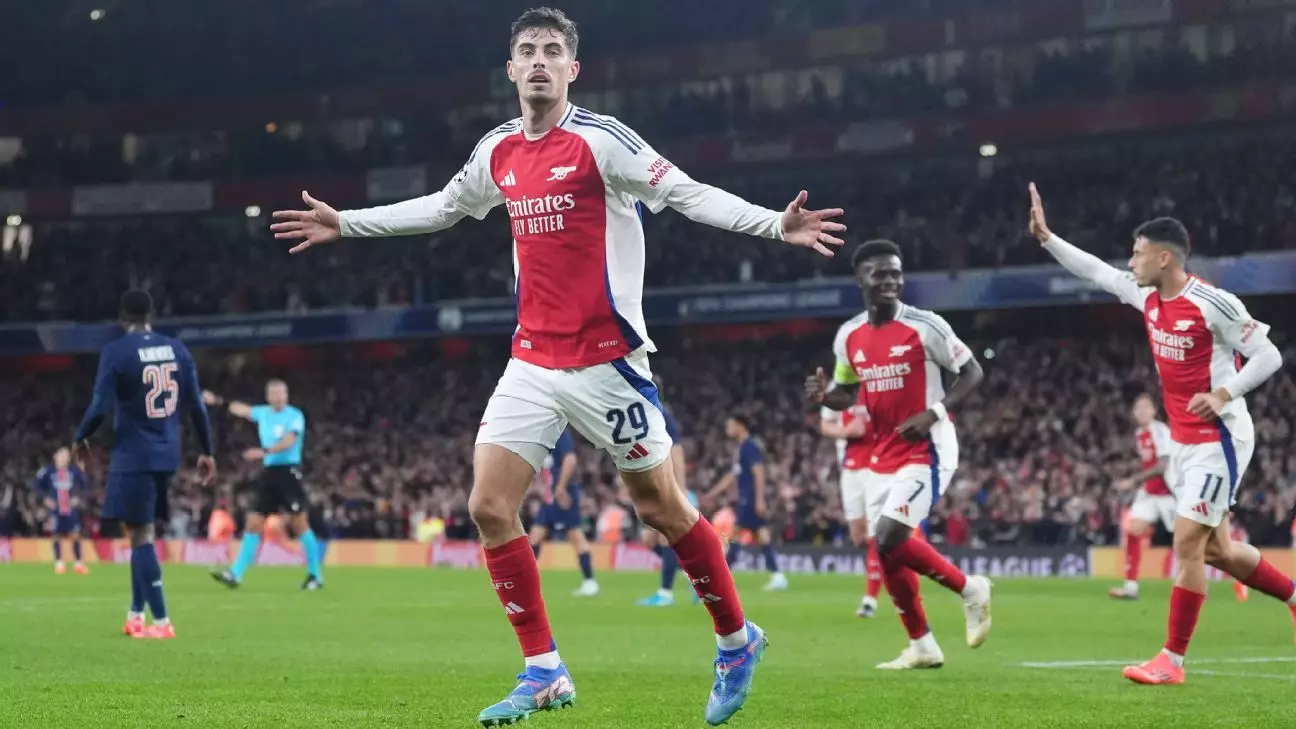Arsenal Football Club recently demonstrated its competitive prowess with a convincing 2-0 victory over Paris Saint-Germain (PSG) in the Champions League. The match, held at the Emirates Stadium, not only secured Arsenal’s first win in the current Champions League season but also reinforced their position in the league stage rankings. Under the astute management of Mikel Arteta, the Gunners have now established an unbeaten record in the league this season, showcasing their evolution into a formidable contender in European football.
The opening goal arrived courtesy of Kai Havertz, whose header found the net after a crucial defensive blunder from PSG’s Gianluigi Donnarumma. This incident underscored the vulnerabilities within PSG’s defense, especially highlighting Donnarumma’s hesitance—a trait that has become increasingly concerning in high-stakes matches. Following Havertz’s goal in the 20th minute, Bukayo Saka capitalized on a free kick in the 35th minute, further distancing Arsenal from their opponents.
Havertz’s performance stood out, marked by his relentless movement and strategic positioning, qualities that justified Arteta’s decision to retain him as a key forward despite earlier speculations. This dynamic forward has now notched up five goals across nine competitions for the club this season, proving instrumental in critical matches.
PSG’s Misfortunes and Strategic Missteps
For PSG, this match will likely be remembered as a bitter disappointment, particularly for Donnarumma, whose errors directly led to both of Arsenal’s goals. Despite his remarkable save early in the match to deny Gabriel Martinelli, the Italian goalkeeper’s overall display was lackluster. The question remains: can PSG truly rely on him during crucial Champions League matches, especially after witnessing his previous errors in high-pressure moments?
PSG’s challenges were further compounded by the absence of Ousmane Dembélé, their key creative force. Coach Luis Enrique’s decision to bench Dembélé was rooted in disciplinary measures following an internal dispute, but it backfired dramatically. The team struggled to establish any rhythm or potency in attack, tragically falling to a mere 0.31 expected goals during the match. The choice of Désiré Doué to replace Dembélé failed to bear fruit, illustrating the lack of experience and creative vision within PSG’s squad when it mattered most.
While Arsenal’s victory is a testament to the team’s collective strength, it also highlights the impressive depth of their squad—an often underrated element of their success. The absence of captain Martin Ødegaard due to injury raised concerns about how the team would adapt in his absence. Yet, as the sixth match without Ødegaard unfolded, Arteta’s squad proved they can navigate challenging games without their captain.
The midfield pairing of Thomas Partey and Declan Rice was pivotal in anchoring the team’s performance. Partey, known for his physical presence and tactical awareness, complemented Rice’s dynamism, allowing them to create opportunities and maintain control in the midfield battle against PSG’s talented players. Their synergy laid the groundwork for Arsenal’s first-half dominance, emphasizing the importance of squad depth in contemporary football.
In addition to established stars, young talents like Riccardo Calafiori are emerging as significant contributors to Arsenal’s success. The 22-year-old full-back displayed tremendous versatility against PSG, seamlessly transitioning between defensive roles and contributing offensively. His performance stands out, especially considering the pressure he faced in crucial moments of the match.
Calafiori’s investment by Arsenal—50 million euros—reflects a commitment to cultivating young talent with a high ceiling for development. His performance not only highlights potential but also showcases a broader trend among elite clubs to prioritize technical proficiency and adaptability in their signings.
As Arsenal looks to build upon this victory, the path toward the Champions League Round of 16 becomes clearer. The Gunners will be bolstered by this win, emboldening their confidence in their ability to compete at the highest level. Meanwhile, PSG must reassess their strategy and performance if they want to be serious contenders for the Champions League title. The glaring gaps in their lineup must be addressed, with particular attention to the goalkeeper position and the necessity for a dependable midfield presence, especially in high-pressure matches.
The 2-0 victory for Arsenal against PSG is more than just a statistic—it is a reflection of strategic growth, depth, and resilience, fundamental traits that are pivotal for success in modern football.

